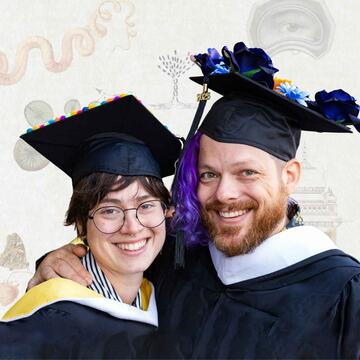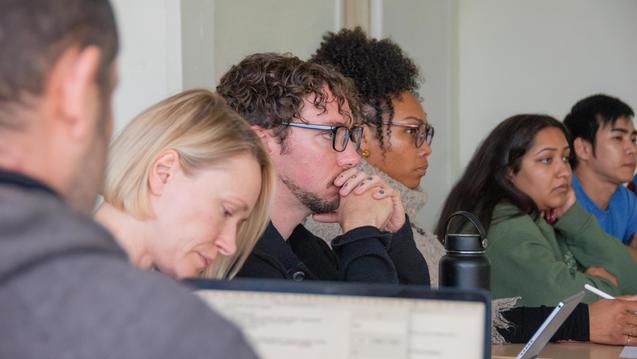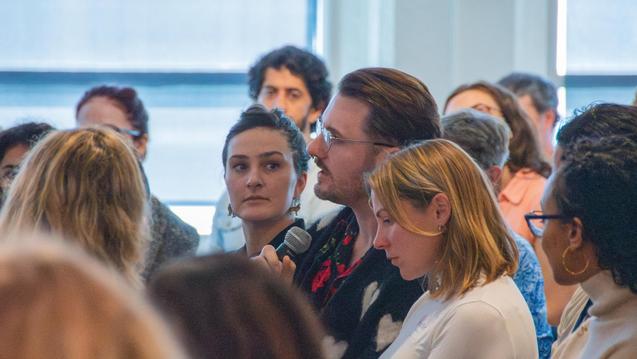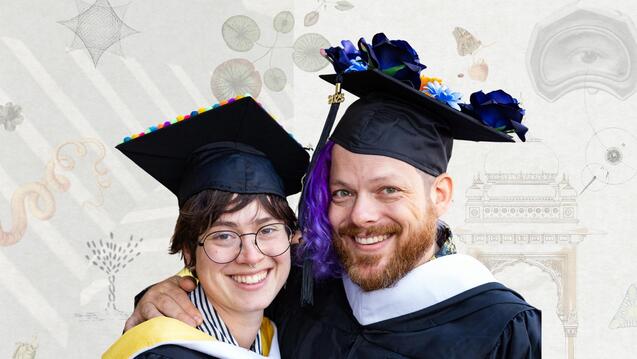An Online Event with Admissions Counselors Ishan McCarthy and Ronda Sharp
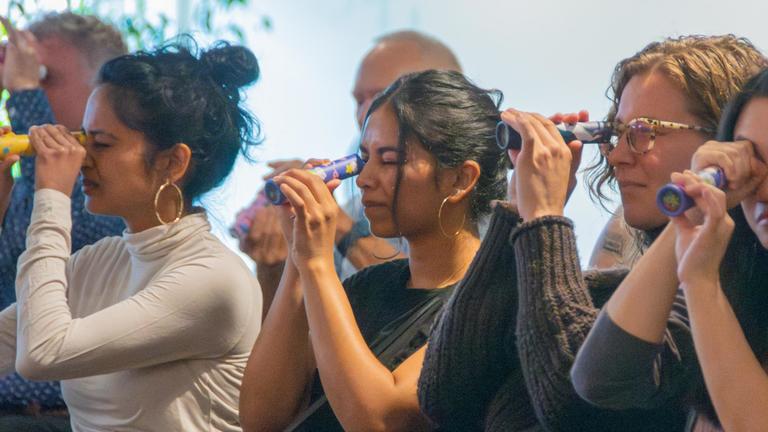
Department of Clinical Psychology
Join a community of forward-thinking psychologists in this unique Psy.D. program.
CIIS’ Clinical Psychology department provides advanced and specialized training in clinical psychology that combines the principles of integral education with the clinical efficacy of contemporary psychodynamic psychotherapy. In the exploration of depth psychology, students will focus on the psyche, human development, personality formation, and individuation, and explore the subtle, unconscious, and transpersonal aspects of human experience.
In Their Own Words
Hear what our faculty and students have to say
Our distinctive approach to doctoral education in clinical psychology is guided by a vision of psychotherapeutic clinical practice that emphasizes holism, depth, and difference. Faculty are committed to creating an environment that is creative, inclusive and transformative on both personal and professional levels. We teach the value of open inquiry and multiple ways of knowing, emphasizing that knowledge is contextual. At the center of this kind of inquiry are whole persons enlivened through a matrix of relationships.
An Inclusive Approach to Navigating Relationship Issues
Professor and licensed psychologist Margaret Boucher, joins renowned certified Gottman therapist and author Elizabeth Earnshaw for a culturally tuned-in conversation about how to navigate difficult relationship issues to create stronger and more resilient partnerships
Our Programs
As part of the School of Professional Psychology and Health, we offer a standard and an advanced curriculum designed for individuals who wish to deepen their training after having obtained a master’s degree.
CIIS also offers multiple master’s degrees in counseling psychology.
Faculty Research and Scholarship
Our faculty have a wide range of research interests: the many intersections between psychodynamic psychotherapy and humanistic, existential, somatic, and transpersonal psychotherapies.

On Reclaiming Mental Health for Asian Americans
In this episode of the CIIS Public Programs Podcast, Associate Professor of Clinical Psychology Lani Chow, talks with Taiwanese American clinical psychologist Jenny Wang about her latest book, Permission to Come Home. Their powerful conversation confronts the intersection between Asian American identity, mental health, and social justice.

Dr. Willow Pearson Trimbach on the Integral Psychotherapy Podcast
Willow Pearson Trimbach joined the Integral Psychotherapy podcast to explore a wide variety of rich topics including: the role of music in healing and the musicality of being; dreaming as a therapeutic domain and a fundamental metaphor; the caesura and the integral 'membranics' of co-presence; relational therapy and working with counter/transference; Bion's O and the antecedent self; binocular and reversible perspectives, and stereoscopic listening; the psychograph as kaleidoscope; working wisely with opposing psychic forces and the dance of creation and destruction; and much more.

Serving the Bay Area Community
Our faculty and students serve the Bay Area community in our award winning Psychological Services Center. Students and staff provide holistic, depth-oriented individual, couples, family, and counseling. In addition, our clinicians offer Psychological Assessments and therapy support groups.
FAQ
-
CIIS' Psy.D. in Clinical Psychology program is a five-year graduate degree program at the doctoral level. It requires the completion of a minimum of 90 semester credits of core classes in addition to the units for practical training and dissertation.
-
We provide specialized training in clinical psychology that combines the principles of integral education with the clinical efficacy of contemporary psychodynamic psychotherapy. We promote an ethos of open and holistic inquiry and emphasize the centrality of relationships in people's lives.
-
It is not. CIIS is accredited by the Western Association of Schools and Colleges–Senior College and University Commission (WSCUC), a federally recognized regional accreditation body. This accreditation meets the standard to apply licensure in California and some other states.
The Psy.D. program’s mission of training students in a depth-oriented oriented approach that integrates psychodynamic theory, humanistic and transpersonal orientations, and a social justice stance does not fit within the APA’s emphasis on short-term behavioral treatment modalities.
-
Students must complete a total of 90.0 semester credit hours. This consists of:
- 85.0 required units
- 5.0 elective units
- 6.0-11.0 units of practicum
- 3.0-4.0 units of internship
In addition to clinical training and other non-course degree requirements, including 45 hours of personal therapy, students must write and successfully defend a dissertation.
-
The minimum time to complete the degree is five years. The first three years are course work and practicum training in preparation for the internship. The internship is 2000 hours and may be completed full-time in one year or part-time in two years. The dissertation is allotted one year for completion outside of all other requirements and may be done before or after the internship.
-
Clinical training consists of:
- Foundations Practicum in spring and summer of the first year (2.5-5.5 hours per week)
- Two year-long practicums at community agencies in the Bay Area during your second and third year, each consisting of 16-24 hours per week. All practicum placements are a part of the Bay Area Practicum Information Collaborative (BAPIC).
- One 2000-hour predoctoral internship that can be completed full-time in one year or part-time in two years. All internship placements are part of The California Psychology Internship Council (CAPIC).
-
The dissertation is a five-chapter, scholarly document of approximately 150-250 pages, written in APA style. Students are supported in creating the first three chapters through three 1.0 unit core classes, which result in their initial dissertation proposal. The dissertation is completed under the guidance of the student’s dissertation chair, who is a member of the Psy.D. core faculty.
-
It is generally not possible to maintain full-time employment while enrolled in the Psy.D. program. You may be able to work part-time, but bear in mind that from the second semester onward, you will have practicum-related hours to complete each week. In the first year, this is not a huge commitment, but practicum placements that begin in the second year are 16–24 hour per week trainings over and above your courses.
-
Students who hold a B.A. or B.S. degree may apply for the Psy.D. program. An M.A./M.S. is not required, nor is a background specifically in psychology. We encourage applicants from many fields to apply, and are primarily looking to enroll those who are interested in reflecting on their internal processes, external relations, past experiences, and positionality/intersectionality and how these influence one’s perspectives, choices, and behaviors.
-
We look for people who are interested in reflecting on their internal processes, external relations, past experiences, and positionality/intersectionality and how these influence one’s perspectives, choices, and behaviors.
-
In California, the Board of Behavioral Sciences regulates master’s-level practitioners (i.e., LMFT, LPCC and LCSW), and the Board of Psychology regulates doctoral-level practitioners (i.e., Psy.D., Ph.D.).
Though both require completion of a qualifying degree and meeting other eligibility requirements, including the successful completion of a fingerprint and background check, the requirements for each license and the scope of practice and competence are different.
In considering which degree you should pursue, it is important to consider carefully what your plans are once the degree has been completed. Please see information table below comparing the Psy.D. to the master’s:
Consideration Psy.D. M.A. Degree Level Professional Doctorate Professional Master’s Qualifying degrees at CIIS Doctor of Clinical Psychology (Psy.D.)
Note that no other doctorate offered through CIIS meets the California academic requirement for the Professional Psychologist license.M.A. in Counseling Psychology
(includes: Community Mental Health, Drama Therapy, Expressive Arts Therapy, Integral Counseling Psychology, and Somatic Psychology)California License available upon completion Licensed Clinical Psychologist - Licensed Marriage and Family Counselor (LMFT)
- Licensed Professional Clinical Counselor (LPCC)
- Licensed Clinical Social Worker (LCSW)
- Licensed Educational Psychologist (LEP)
Units to complete - 90.0 course units
- Internship
- Dissertation
- 60.0 course units
- Practicum
Program length 5 years minimum 2.5-3 years minimum Board responsible for licensure California Board of Psychology (BOP) California Board of Behavioral Sciences (BBS) Examinations - Take and pass the EPPP
- Take and pass the CPLEE
Take and pass relevant exams depending on license. Typically, there are two (a clinical specific and a laws & ethics exam) Practice hours required for licensure - 1,500 pre-degree hours (completed before graduation)
- 1,500 post-degree hours (completed after graduation)
3,000 total supervised hours, over 104 weeks (minimum) Definition of Scope of Competence & Scope of Practice Overall, obtaining a license as a clinical psychologist means you have achieved a certain level of knowledge and skill set (scope of competence) and are allowed to offer services as related to that expertise (scope of practice) In CA, scope of competence and scope of practice varies depending on type of license (LMFT, LPCC, LCSW). Generally, these licenses might have restrictions when compared to a doctorate license.
Visit the BBS website for more information: www.bbs.ca.gov
Scope of Competence A doctorate degree means more courses. Some highlights in our Psy.D. program include:
- In addition to foundational courses, our students complete an advanced series on depth psychology (3 courses, 3 units each), and an advanced seminar in Cultural Psychology (2 units);
- 9.0 units of assessment classes (3 courses, 3.0 units each) where students learn and practice the administration, scoring, interpretation and report writing of comprehensive batteries including cognitive and personality assessments;
- 2 years of practicum and 1 year of predoctoral internship; Clinical training: 1 practicum
- Research & Dissertation: Our students complete 2 courses (3 units each) of on research, and 3 (1.0 unit each) courses on proposal writing which help them complete their dissertation.
- Unique course offerings such as required course, Supervision & Consultation (2 units), and electives such as Jungian Psychotherapy, Psychedelic Studies and Trauma-Informed Care
- Assessment: in M.A. programs, students complete a 3.0 unit course;
- Clinical training: 1 practicum
Scope of Practice Due to the above, our graduates are able to offer:
- Comprehensive assessment and testing services. Licensed clinical psychologists can offer testing as a sole clinical intervention, which is not true for M.A. licensed professionals;
- Command a higher salary or fee due to having more clinical training (2 practicums, 1 predoctoral internship & postdoctoral hours);
- Being able to teach undergraduate and graduate levels (M.A. and doctorate programs)
Visit the BBS website for more information: www.bbs.ca.gov It is important to note that while a Master of Clinical Psychology is available as an interim degree in the Psy.D. program, this degree does not meet the California academic requirements for the LMFT, LPCC, or LCSW licenses.
Our Upcoming Events
Attend our in-person event on January 31 or online event on February 21.
An Online Overview with Jennifer Gruczelak and Ronda Sharp


Our Department in Action
Your roadmap to becoming a licensed clinical psychologist through CIIS' integral, holistic approach to doctoral training and professional practice.
Dr. Karim Dajani, M.A. '95, Integral Counseling Psychology, joined Clinical Psychology’s annual spring conference to explore the social unconscious in the work of Wilfred Bion.
CIIS plans to expand its community health services with the launch of a new psychedelics clinic that will provide patients with ketamine-assisted treatments, the first of its kind to be associated with a university in the United States.


